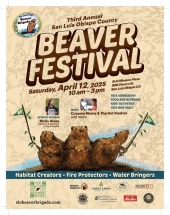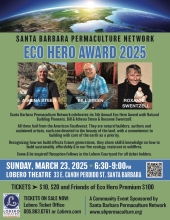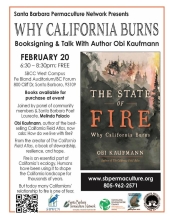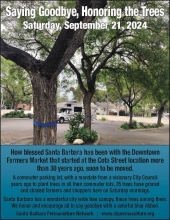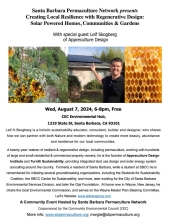Santa Barbara Permaculture Network
2026 6th Annual Eco Hero Award
Watersheds, Our Basins of Relations
An Evening with Kate Lundquist & Brock Dolman
Honoring Two Transformative Advocates & Activists for Beavers, Salmons & Watersheds
Come & Be Inspired!
Sunday, March 8, 6:30-9pm, 2026
TICKETS $14, $24, & Friends of Eco Hero $100 (2026 fundraiser)
https://www.lobero.org/events/eco-hero-award-2026/
Students & Kids free
Location: Lobero Theatre
33 E Canon Perdido St, Santa Barbara, CA 93101
Tickets on Sale Now: Lobero Ticket Office
Food, fun & conversation follows with Reception in the Lobero Courtyard
How We're Winning the Campaign to Rehydrate the West, Brock Dolman & Kate Lundquist
Santa Barbara Permaculture Network celebrates its 6th Annual Eco Hero Award, a community event that honors those making significant and positive change in the world for more than 30 years. This year we honor Brock Dolman & Kate Lundquist who will join us in person at the event.
,
Brock Dolman & Kate Lundquist are transformative advocates and activists for beavers, salmons & the watersheds they inhabit. Co-directors of the WATER Institute at the Occidental Arts & Ecology Center (OAEC) they have launched an extraordinarily effective ---- movement that has engaged individuals, communities, and policymakers, changing hearts & minds about how to coexist with the natural world.
Water is the basis of all life, and in their Basins of Relations Citizens Guide to Protecting Our Watersheds, they note “Now and, in the future, nothing is, or will be, more valuable than pristine watersheds”. Nature based solutions are what they propose, informing and educating in a clear and entertaining style.
Brock, known for his entertaining fast speak poetry style when giving presentations, coined the now widely used "Slow it, spread it, sink it” slogan to encourage strategies to keep water on the land.
In launching their Bring Back the Beaver campaign for a formerly much maligned & sometimes troublesome rodent, they established beavers reputation as a “Climate Restoration Heroes”. Beavers are a keystone species, that when allowed to do what comes naturally, building dam complexes that create wetlands that re-hydrate whole dusty landscapes suffering from drought, the benefits are obvious. Wetlands are amazing carbon sinks, and those created by beaver also prove to be effective fire breaks & refugia’s for other wildlife, especially with mega fires California and the Southwest have experienced in recent years. Native to North America, in populations in the millions, beaver have been coexisting with both Salmon and Steelhead for thousands of years.
Beavers are native to North America (Castor canadensis), in populations in the millions, before the European fur trade decimated their numbers almost to extinction. They are responsible for a landscape most early settlers and farmers took for granted—deep soils built up over centuries with ponds & wetlands they created. These wetlands function as natural sponges, trapping silt, making them excellent carbon sinks, that help with climate change.
The WATER Institute
https://oaec.org/our-work/water-institute/ has worked collaboratively with tribal groups re-establishing beaver on their lands. A Beaver Help Desk has been launched to answer questions from the public about coexisting with beaver, sometimes a tricky business.
Federal and State government agencies, tribal governments, and state legislators are joining nonprofits, scientists, individuals, ranchers, farmers, and other landowners in new partnerships with the shared goal of harnessing what beavers do to help restore river systems and create watershed resiliency.
In 2024, OAEC was chosen by CA's 2nd Senate District as nonprofit of the
year. They created a cool Beaver website portal, a robust project with information
The Santa Barbara Permaculture Network Eco Hero Award honors those individuals who have committed themselves to work in service of the planet and its inhabitants for more than thirty years, with actual solutions and concrete ways forward that benefit many, often on a global scale. We encourage the next generation to come and participate in a robust Q&A, a part of every Eco Hero event, and to learn from our Eco Heroes who have so much to share. Reception follows in the Lobero courtyard, with time for more questions & conversation, community organizations tabling, & light refreshments, including our traditional Empanada buffet.
Past recipients of the Santa Barbara Permaculture Network Eco Hero Award include John D. Liu; Paul Stamets & Louie Schwartzberg; John & Nancy Jack Todd, Albert Bates; Bill & Athena Steen, with Roxanne Swentzell.
The event takes place on Sunday; March 8; 6:30–9pm, at the Lobero Theatre, 33 E Canon Perdido St, Santa Barbara, CA 93101. TICKETS $14, $24, & Friends of Eco Hero $100. More information 805-962-2571;
margie@sbpermaculture.org; www.sbpermaculture.org.
Co-sponsored by Blue Sky Biochar, Bamboo DNA, Buena Onda Empanadas, Teeccino, Ah Juice, the Community Environmental Council (CEC), SBCC Environmental Horticulture, Explore Ecology, Regenerative Landscape Alliance, Island Seed & Feed, Orella Ranch/Gaviota Givings, Santa Barbara Aquaponics, Sustainable World Radio, Santa Barbara Agriculture & Farm Foundation, Paradise Found, Quail Springs Permaculture, Hour Books, Mesa Harmony Garden, Rincon-Vitova Insectaries, Building Health Matters, Central Coast Building Council, Voice Magazine, and the Santa Barbara Independent., Occidental Arts and Ecology, The Water institute, Slo Beaver Brigade, SB Beaver Brigade, Sweet Smiling Landscape Company.
A Community Event Hosted by Santa Barbara Permaculture Network
www.sbpermaculture.org
MORE INFO
Brock Dolman cofounded the Occidental Arts & Ecology Center (OAEC) in 1994, and with Kate Lundquist is the co-director of the Water Institute at OAEC. A wildlife biologist,Permaculture Teacher and watershed ecologist, he has been active in the Bring Back the Beaver movement in California for over twenty years. He received the Salmonid Restoration Golden Pipe Award in 2012 for his leading role in restoring native habitat for beavers and salmon. For over a decade, he has served as an appointed commissioner on the Sonoma County Fish & Wildlife Commission
Kate Lundquist is the codirector of the Occidental Arts & Ecology’s WATER Institute, and the Bring Back the Beaver Campaign in Sonoma County. As a conservationist, educator and ecological artist, Kate works with landowners, communities, and resource agencies to remove obstacles impeding progress to restore healthy watersheds and native habitats for beavers and other wildlife.






